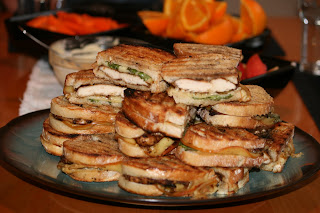Two things came together yesterday to cause this post. The first was a paragraph
quoted by Alan Jacobs on his common-book website,
More than 95 Theses, and re-tweeted by my
friend. Here’s the quote:
“The Lenten season is devoted especially to what the theologians call contrition, and so every day in Lent a prayer is said in which we ask God to give us ‘contrite hearts.’ Contrite, as you know, is a word translated from Latin, meaning crushed or pulverized. Now modern people complain that there is too much of that note in our Prayer Book. They do not wish their hearts to be pulverized, and they do not feel that they can sincerely say that they are ‘miserable offenders.’ I once knew a regular churchgoer who never repeated the words, ‘the burden of them (i.e. his sins) is intolerable’, because he did not feel that they were intolerable. But he was not understanding the words. I think the Prayer Book is very seldom talking primarily about our feelings; that is (I think) the first mistake we’re apt to make about these words ‘we are miserable offenders.’ I do not think whether we are feeling miserable or not matters. I think it is using the word miserable in the old sense — meaning an object of pity. That a person can be a proper object of pity when he is not feeling miserable, you can easily understand if you imagine yourself looking down from a height on two crowded express trains that are traveling towards one another along the same line at 60 miles an hour. You can see that in forty seconds there will be a head-on collision. I think it would be very natural to say about the passengers of these trains, that they were objects of pity. This would not mean that they felt miserable themselves; but they would certainly be proper objects of pity. I think that is the sense in which to take the word ‘miserable.’ The Prayer Book does not mean that we should feel miserable but that if we could see things from a sufficient height above we should all realize that we are in fact proper objects of pity.”
While this quote is really directed at the reception of the Prayer Book, what is says about modern people is worth noting. How much of the reality that modern people “do not wish their hearts to be pulverized,” and “do not feel that they can sincerely say that they are ‘miserable offenders’” is because we, modern people, do not feel the horror, yes,
horror of sin.
If a man lusts in his heart, what are the consequences? If a man yells at his children or struggles with pride or wastes time when he should be working or is not grateful to the Lord for all the good gifts he has received, how does he feel the weight, the significance of his sin?
If a woman gossips to her friends or doesn’t return the five dollars the clerk mistakenly gave her at the checkout counter or doesn’t honor her husband or isn’t thankful that the Lord has sustained her family for another day, how does she feel the force of her sin?
The reality, I think, for Christians in this modern era, is that we don’t, no, we
can’t, comprehend the hideousness, the disgust, awfulness of our sin, until we understand that sin
is hideous, disgusting, and awful. How often have you heard someone cluck about so-and-so, “He won’t really wake-up until he hits bottom”? The point is that modern people seemingly have to be confronted with dire consequences of sin before they realize the seriousness of the sin. A woman has to divorce her husband before he realizes that his addiction to pornography is hideous. A man has to go to jail before he realizes that cheating on taxes is a breaking of Jesus’ command.
The second thing was reading from the first chapter of Leviticus. Note the use of the personal pronouns in these verses.
The LORD called Moses and spoke to him from the tent of meeting, saying, “Speak to the people of Israel and say to them, When any one of you brings an offering to the LORD, you shall bring your offering of livestock from the herd or from the flock.
“If his offering is a burnt offering from the herd, he shall offer a male without blemish. He shall bring it to the entrance of the tent of meeting, that he may be accepted before the LORD. He shall lay his hand on the head of the burnt offering, and it shall be accepted for him to make atonement for him. Then he shall kill the bull before the LORD, and Aaron’s sons the priests shall bring the blood and throw the blood against the sides of the altar that is at the entrance of the tent of meeting. Then he shall flay the burnt offering and cut it into pieces, and the sons of Aaron the priest shall put fire on the altar and arrange wood on the fire” (Leviticus 1:1–7).
What shocked me was that the person who leads the male animal from the herd to the tent of meeting is the sinner. The person who lays his hands on the head of that animal is the sinner. The person who takes the knife in his hand and with a nervous jerk tries to slice the animal’s throat, feeling its warms blood spill out over his hands and the animal jump and kick and try to get free, all the while getting weaker as its life-blood drains away into the priests pot.
He shall kill the bull before the Lord.
I had previously thought the priest did all the killing. How do I know it is the sinner and not the priest? Because of the pronouns. “
He shall kill the bull before the Lord, and Aaron’s sons the priest shall bring the blood….” In the first paragraph God says, “When any one of
you brings an offering to the Lord…. If his offering is a burnt offering….
He shall bring it to the entrance…, that
he may be accepted….
He shall lay his hand on the head….Then
he shall kill the bull before the Lord.”
Aaron’s sons aren’t doing the killing, they are catching the blood and flinging it against the alter, but the
sinner is doing the slaughter. Keep reading in this chapter and see how in each case the sinner kills the animal, except for turtledoves and pigeons, where the priest twists off its head. (I talked with the BCS OT professor and he tentatively agreed with me. Granted, Hebrew pronouns can be difficult, but it seems that the sinner leads the animal, kills it, and from then on the priests do all the rest of the ritual work.)
When was the last time you slit an animal’s throat?
So, putting these things together, it seems that the sacrificial system had a built-in way to help people feel the hideousness, the disgust, the awfulness, the weight of sin, in a way we moderns can’t comprehend. Some animal really had to die when they committed sin.
The truth, for a New Testament Christian, is that
someone had to die when we sin as well. This One’s death was hideous, disgusting, and awful. The weight of his death brought darkness upon the earth for hours and tore the veil between the people and the Holy of Holies. The weight of his death broke open graves and caused the dead to walk alive. The force of his death changed the reality of the universe from that point forward. His death is the determining factor for the fate of humanity.
Jesus is the spotless lamb upon whom believing Christians placed their hands and drew the knife across his throat.
Praise God.
Hate sin.




